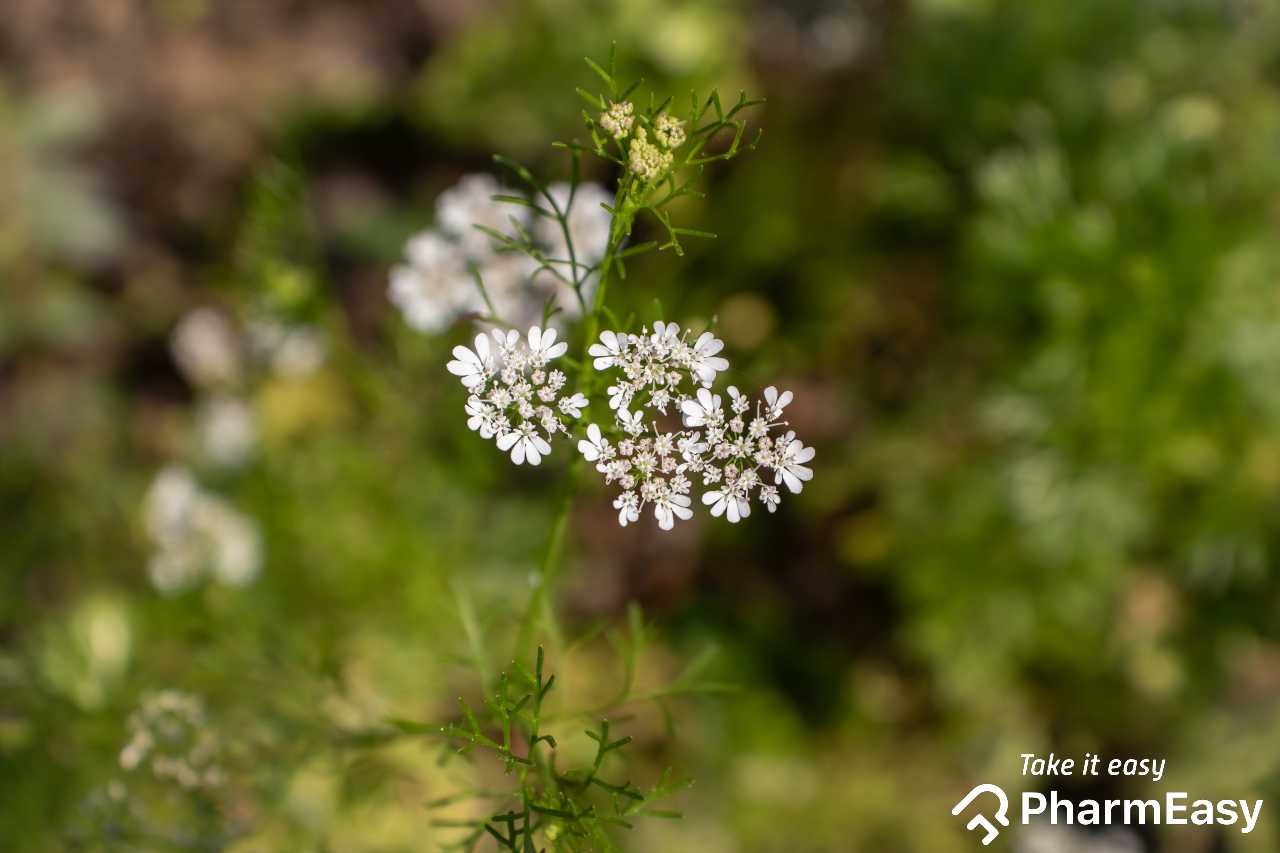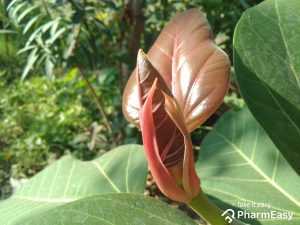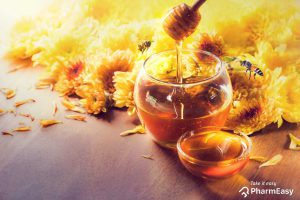Table of Contents
Introduction:
Dhania, also called coriander, is a herbal plant that has various medicinal and culinary uses. Its botanical name is Coriandrum sativum L., and it belongs to the family Apiceae. All the parts of this plant are used as a traditional remedy and flavouring agent for the management of various diseases by different civilisations in the folk medicine system.[1]
Coriander is a soft and slender plant growing up to 50 cm in height and cultivated throughout India. Dhania is one of the oldest herbs recorded and has been used for more than 5000 years. Young coriander plants are utilised in the kitchen to prepare salads, soups, curries, and sauces, while the fruit obtained from coriander is mainly used as a seasoning for pickles, mixtures, etc. The essential oil of dhania is employed in pharmaceutical formulas. Apart from being used in the kitchen, dhania is also popular for its healing properties and medicinal benefits.[2]

Nutritional Value of Dhania:
The main component of essential oil from coriander seeds is linalool (60%-80%). This essential oil also contains ketones, alcohols, and esters like α-pinene (0.2-8%), geranyl acetate (0.15-4.7%), γ-terpinene (1%-8%), and camphor (0.9%-4.9%).[3] In 100 grams of dhania, the nutrients found are:[4]
| Nutrient | Content |
| Water | 92.2 g |
| Energy | 23 kcal/95 KJ |
| Carbohydrate, by the difference | 3.67 g |
| Fat | 0.52 g |
| Sugars | 0.87 g |
| Total dietary fibre | 2.8 g |
| Iron | 1.77 mg |
| Calcium | 67 mg |
| Magnesium | 26 mg |
| Potassium | 521 mg |
| Phosphorus | 48 mg |
| Copper | 0.225 mg |
| Selenium | 0.9 µg |
| Zinc | 0.5 mg |
| Manganese | 0.426 mg |
| Sodium | 46 mg |
| Vitamin C | 27 mg |
| Riboflavin | 0.162 mg |
| Pantothenic acid | 0.57 mg |
| Folate | 62 µg |
| Thiamin | 0.067 mg |
| Niacin | 1.11 mg |
| Vitamin B6 | 0.149 mg |
Table 1: Nutrient content per 100 g of raw dhania leaves4
Also Read: Bhumi Amla: Uses, Benefits & Side Effects
Therapeutic Uses of Dhania:
All parts of dhania have different medicinal uses and have been used traditionally across the world. Dhania is known for its medicinal properties like:
- Antidiabetic
- Antimicrobial
- Anxiolytic (anti-anxiety)
- Antidepressant
- Anticonvulsive
- Diuretic (increases the flow of urine)
- Antihypertensive
- Antioxidant
- Anti-dyslipidemic (cholesterol-lowering)
- Anti-inflammatory
- Antimutagenic (counteracting the impact of cancer-producing agents)
- Sedative1,2
Benefits of Dhania:
1. Benefits of dhania for the digestive system:
The main use of dhania is to manage digestive problems, abdominal discomforts, and loss of appetite. The leaves of dhania are used as an appetiser for managing indigestion and relieving stomach cramps and muscle spasms to manage discomforts in the abdominal system. The fruits of dhania are also used in cases of indigestion. Dhania is also known to be a good carminative (relieving gas accumulation) agent. In some parts of Pakistan, dhania has been used to manage flatulence, diarrhoea, stomach problems, vomiting, and jaundice. Dhania also enhances bowel movements and functions as a mild laxative. It is also effective against ulcerative colitis and hepatitis.2
2. Benefits of dhania for the respiratory system:
The leaves of dhania are consumed and also applied topically to manage coughs and chest pains. The fruits of dhania are known to be effective against bronchitis, cough, and intermittent fevers. Dhania also contains expectorant (expelling mucus) properties. Seeds of dhania are used to treat influenza in traditional Chinese medicine. Dhania is also effective in managing dyspnoea (difficulty in breathing).1,2
3. Benefits of dhania for the skin:
Dhania is effective in the management of skin disorders like pimples, eczema, dry skin, skin ulcers, and blackheads. It is helpful in managing allergies, hay fever, rashes, and urticaria.2
4. Benefits of dhania for menstrual problems:
Decoction obtained from dhania seeds is taken with sugar for managing excessive bleeding during menstrual flow.2
5. Benefits of dhania for fever:
The decoction obtained from dhania leaves and seeds is used to control fever.2
6. Benefits of dhania for the central nervous system:
Dhania, boiled with milk, has effects on the central nervous system and helps manage syncope, vertigo, and memory loss. It also helps to relieve anxiety. Dhania is also helpful in insomnia (sleeplessness). Due to its vitamin K content, dhania is helpful in the management of Alzheimer’s disease. The aqueous and ethanolic extracts of coriander seeds are also used to prevent convulsions.1,2
7. Benefits of dhania for the eyes:
Dhania is good for the eyes, and it decreases burning sensation and irritation. The antioxidants present in dhania help prevent eye diseases.2
8. Benefits of dhania as a diuretic:
Diuresis means expelling excess fluid and salt from the body. According to studies, the seeds of dhania enhanced diuresis, glomerular filtration rate, and excretion of electrolytes from the body in a dose-related manner.2
9. Benefits of dhania for diabetes:
Dhania is a good remedy for diabetic patients. It helps manage diabetes by stimulating insulin secretion and lowering blood sugar levels in the body.2
10. Benefits of dhania as an antimicrobial agent:
According to studies, the essential oil of dhania obtained from the seeds exhibited antifungal activity against Candida albicans. Essential oil and aqueous extract of coriander leaves exhibited inhibitory activity against Gram-positive group of bacteria like Staphylococcus aureus, Bacillus sp and Gram-negative bacteria like Escherichia coli, Salmonella typhi, Proteus mirabilis etc.1
11. Benefits of dhania as a cholesterol-lowering agent:
According to animal studies, coriander seeds exhibited cholesterol-lowering effects. The observations made were: a reduction in triglyceride levels, low-density lipoprotein (bad cholesterol) and very-low-density lipoprotein. There was also an increase in high-density lipoprotein (good cholesterol) levels.1
How to Use Dhania?
Dhania essential oil is used in different ways like:
- In foods as preservative and flavouring agent
- In pharmaceutical products5
The green leaves of coriander, also called cilantro, are utilised in the preparation of salads, Mexican salsas, chillies, seafood dishes and different ethnic foods. The aromatic coriander fruit or seeds are used in dishes, bread, soups, stews, curry meat, and puddings.3
Side Effects of Dhania:
Dhania as a seasoning and spice is considered safe by the US Food and Drug Administration. Dhania and its constituent linalool have been tested for safety. Dhania and linalool did not have toxicity, denoting that dhania essential oil is safe for use. Dhania leaves and seeds have not been associated with any adverse events when used in traditional medicine.
However, there was a case report of a woman from Iran who reported endocrine toxicity when she had consumed an excess of dhania leaf extract for seven consecutive days.3
Also Read: Kanchanar Guggulu: Benefits, Side Effects, Precautions & More!
Frequently Asked Questions:
What is dhania?
Dhania, also known as cilantro or coriander, is a herbal plant that has various medicinal and culinary uses. It is used as a herbal flavouring agent in the preparation of sauces, salads, chillies, seafood dishes, Mexican salsa, and different ethnic foods. Dhania is also used to prepare herbal medicines.3
What are the common names of dhania?
Dhania is known by various names like Chinese parsley, coriander, cilantro, coriandro, coriander, culantrillo. Its scientific name is Coriandrum sativum.6
Where is dhania cultivated?
Coriandrum sativum is a native herb of Italy and is cultivated in the Mediterranean regions like Egypt, Morocco, Malta, Asia (Bangladesh, Pakistan, China, and India), and central and eastern Europe.1
Can dhania be used to relieve headaches?
Yes, the juice obtained from fresh dhania leaves, when applied to the forehead, helps manage headaches.2
Can dhania be used to manage problems related to urination?
Yes, dhania can be used in the management of urethritis and urinary tract infections. It is also used to deal with the problems related to the bladder.1,2
Can dhania be used for treating anaemia?
Due to its high iron content, dhania is helpful for people suffering from anaemia.2
Does dhania have antifungal properties?
Yes, the essential oil of dhania is reported to have antifungal properties. Dhania essential oil exhibited fungicidal (fungi killing) properties against Candida albicans.2
Where is dhania cultivated in India?
In India, dhania is widely cultivated in Maharashtra, Uttar Pradesh, Rajasthan, Madhya Pradesh, Karnataka, Bihar, Tamil Nadu, West Bengal, Andhra Pradesh, and Jammu and Kashmir.2
How is dhania used in Ayurvedic medicine to treat digestive problems?
In Ayurvedic medicine, the seeds of dhania are used with caraway and cardamom seeds to manage digestion related problems.1
How is dhania employed in traditional Chinese medicine?
In traditional Chinese medicine, seeds of dhania are used to manage indigestion, stomach pain, bad breath, influenza, and anorexia (loss of appetite).1
Can dhania be used in rheumatism and arthritis?
Yes, dhania can be used as an ointment to deal with arthritis (swelling of joints) and rheumatism (a condition affecting muscles, bones, and joints).1
Can dhania be used for mouth ulcers?
The antiseptic properties of dhania help to deal with mouth ulcers.2
Also Read: Avipattikar Churna: Uses, Benefits, Side Effects & More!
References:
- Najla Gooda Sahib, Farooq Anwar, Anwarul-Hassan Gilani, Azizah Abdul Hamid, Nazamid Saari, and Khalid M. Alkharfy; Coriander (coriandrum Sativum L.): A potential source of high-value components for functional foods and nutraceuticals- A review. Wiley online library. Available from: https://www.researchgate.net/publication/234029175_Coriander_Coriandrum_sativum_L_A_Potential_Source_of_High-Value_Components_for_Functional_Foods_and_Nutraceuticals_-_A_Review/link/5a6dfc7daca2722c947f27d3/download
- K.K Chahal, Ravinder Singh, Amit Kumar, and Urvashi Bhardwaj; Chemical composition and biological activity of coriandrum sativum L: A review. Indian Journal of Natural Products and resources. 2017 Sep 8(3): 193-203 Available from: https://www.researchgate.net/publication/322483650_Chemical_composition_and_biological_activity_of_coriandrum_sativum_l_A_review
- Single, Keith Ph.D.; Coriander: Overview of potential health benefits. Nutrition today. 2016 51 (3): 151-161 Available from: https://journals.lww.com/nutritiontodayonline/fulltext/2016/05000/coriander__overview_of_potential_health_benefits.8.aspx
- U.S Department of agriculture. Coriander (cilantro) leaves, raw [Internet] Available from: https://fdc.nal.usda.gov/fdc-app.html#/food-details/169997/nutrients
- Shyamapada Mandal, Manisha Mandal; Coriander (coriandrum sativum L.) essential oil: Chemistry and biological activity. Asian Pacific Journal of Tropical Biomedicine. 2015 June 5(6):421-428 Available from: https://www.sciencedirect.com/science/article/pii/S2221169115000647
- CABI. Coriander Sativum (coriander). [Internet] Available from: https://www.cabi.org/isc/datasheet/15300#tosummaryOfInvasiveness
[1] https://www.researchgate.net/publication/234029175_Coriander_Coriandrum_sativum_L_A_Potential_Source_of_High-Value_Components_for_Functional_Foods_and_Nutraceuticals_-_A_Review/link/5a6dfc7daca2722c947f27d3/download
[2] https://www.researchgate.net/publication/322483650_Chemical_composition_and_biological_activity_of_coriandrum_sativum_l_A_review
[3] https://journals.lww.com/nutritiontodayonline/fulltext/2016/05000/coriander__overview_of_potential_health_benefits.8.aspx
[4] https://fdc.nal.usda.gov/fdc-app.html#/food-details/169997/nutrients
Read more about: Know All About Hibiscus Tea: Benefits, Uses And Side Effects
Disclaimer: The information provided here is for educational/awareness purposes only and is not intended to be a substitute for medical treatment by a healthcare professional and should not be relied upon to diagnose or treat any medical condition. The reader should consult a registered medical practitioner to determine the appropriateness of the information and before consuming any medication. PharmEasy does not provide any guarantee or warranty (express or implied) regarding the accuracy, adequacy, completeness, legality, reliability or usefulness of the information; and disclaims any liability arising thereof.
Links and product recommendations in the information provided here are advertisements of third-party products available on the website. PharmEasy does not make any representation on the accuracy or suitability of such products/services. Advertisements do not influence the editorial decisions or content. The information in this blog is subject to change without notice. The authors and administrators reserve the right to modify, add, or remove content without notification. It is your responsibility to review this disclaimer regularly for any changes.



 By
By 










Comments